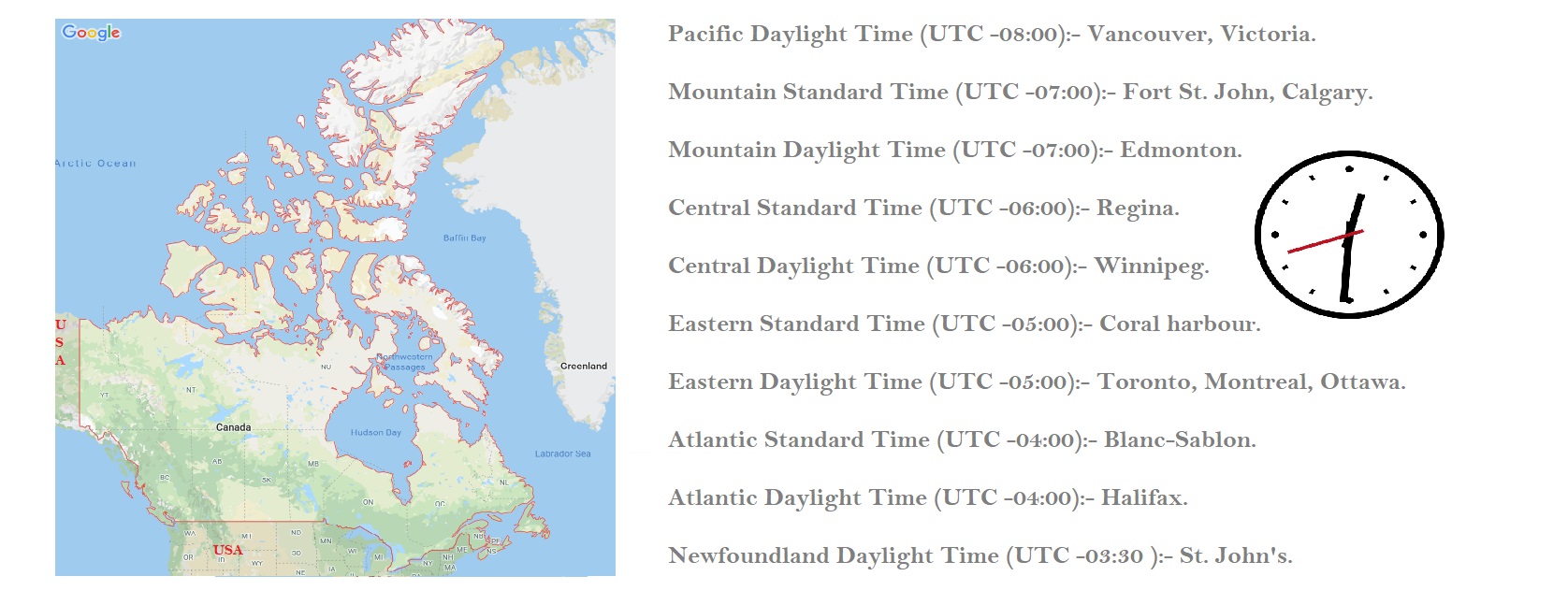
Canada Time Zones
Canada is the country which has vast land and is spread with bigger square miles which make it to have different time zones just like USA. The Canada is divided into six time zones which was based by Scottish Railway Engineer Sir Sandford Fleming. Although, in all countries of the world time is divided into 12 or 24 hour format, the world time zone system is based on standard prime meridian. The Canada operates on the standard time from first Sunday in November to the second Sunday in March which gives daylight saving time for the rest of the year.
The Official time of the National Research Council( NRC) which manages the Canada’s official time through the use of atomic clocks. The NRC makes time servers are available for the direct synchronization with the help of computers. The Canadian broadcasting corporation has aired a daily time signal with the National Research Council Time Signal with November 5, 1939. The Government of Canada recommends the use of 24-Hour Clock with widely used in contexts which also schedules the transportation system and the parking meters along with data transmission is something which is understood by the fact that whether it is the bus, train or metro services every mode of transport is governed by Canada Time Zones.
Now, talking about the Time zones in Canada it is governed by UTC which is according to the World Time Standard which is the basis for civil time today. The 24-Hour time standard is highly precise and atomic clocks which is as per according to the Earth’s rotation. Now, thinking about the Time Zone in Canada it is based into standard basis and is divided into 6 names:
1. Newfoundland (UTC -03:30 )
2. Atlantic (UTC -04:00)
3. Eastern (UTC -05:00)
4. Central (UTC -06:00)
5. Mountain (UTC -07:00)
6. Pacific (UTC -08:00)
Here are the abbreviations attached with the time zone:
PDT-Pacific Daylight Time (UTC -08:00):- City like Vancouver, Victoria.
MST-Mountain Standard Time (UTC -07:00):- City like Fort St. John, Calgary.
MDT-Mountain Daylight Time (UTC -07:00):- City like Edmonton.
CST-Central Standard Time (UTC -06:00):- City like Regina.
CDT-Central Daylight Time (UTC -06:00):- City like Winnipeg.
EST-Eastern Standard Time (UTC -05:00):- City like Coral harbour.
EDT-Eastern Daylight Time (UTC -05:00):- City like Toronto, Montreal, Ottawa, Quebec City, Hamilton, Kitchener.
AST- Atlantic Standard Time (UTC -04:00):- City like Blanc-Sablon.
ADT- Atlantic Daylight Time (UTC -04:00):- City like Halifax.
NDT- Newfoundland Daylight Time (UTC -03:30 ):- City like St. John's.
Now, explaining UTC which is the Coordinated Universal Time and is based on the basis for civil time today along with 24-Hour time standard which is about highly precise atomic clocks which is combines with Earth’s rotation. It has become the standard commonly used all across the world. The atomic and solar time are the two components which determine UTC and with the International Atomic Time (TAI). A time scale which combines with output of some 400 highly precise atomic clocks which is based on worldwide at various stations provides the exact speed for the clocks to tick. The Universal Time is also adjusted several times until 1972 which leap seconds and introduced to keep UTC in line with Earth’s rotation which is not entirely even not less than atomic clocks.